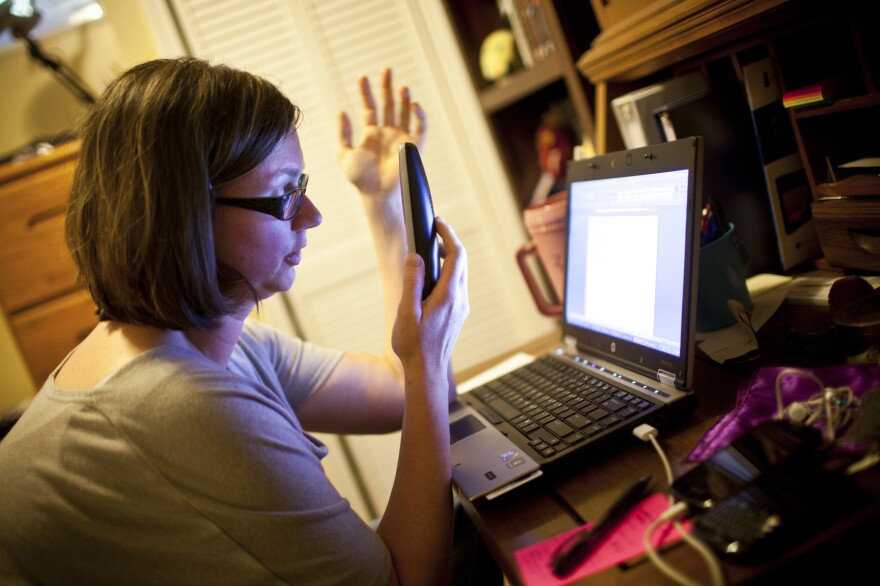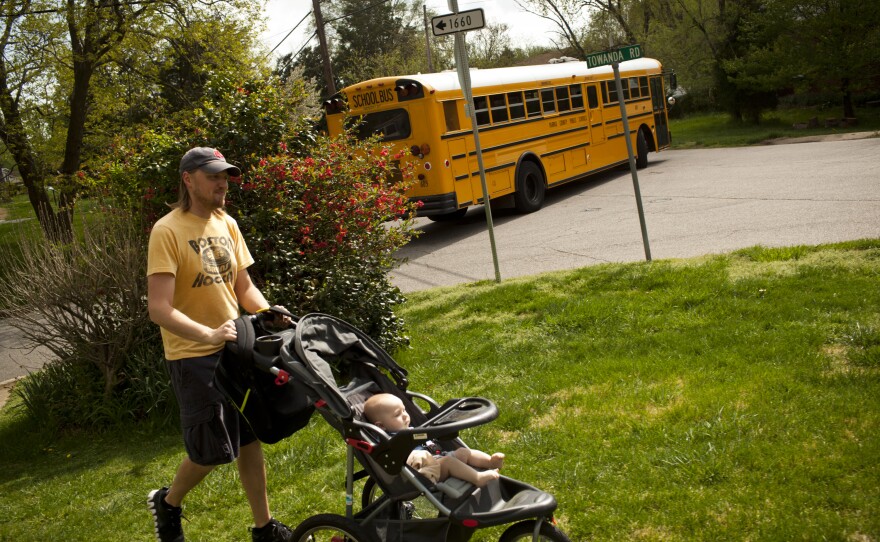The next time you see a father out shopping with his kids, you might need to check your assumptions.
"I'll get the, 'Oh, look, it's a dad! That's so sweet!' "says Jonathan Heisey-Grove, a stay-at-home father of two young boys in Alexandria, Va., who is pretty sure the other person assumes he's just giving Mom a break for the day. In fact, he's part of a growing number of fathers who are minding the kids full time while their wives support the family and who say societal expectations are not keeping up with their reality.
He and his wife, Dawn, a public health analyst, didn't exactly plan for Jonathan to be a stay-at-home parent to Egan, 5, and Zane, who's 4 months old. The Heisey-Groves were both working full time when he lost his job as a graphic designer two years ago. That also ended the company day care. Dawn says Jonathan stayed home at first just to save money on child care.
"And suddenly the world just became much calmer and quieter. Egan wasn't as upset and he wasn't as tense anymore. And our relationship, even though we were stressed about not having money, we weren't rushing around when both of us got home. And so, it was just a happier place," she says.

Dawn was surprised — and happy — to discover two colleagues whose husbands are also stay-at-home fathers. But she does feel like she's missing out sometimes.
"I showed up for the preschool graduation, and they all looked at me like, 'Who are you?' And I kind of felt like the bad mom moment. Like, he's got the Dad of the Year award, and I'm kind of sitting on the sidelines a little bit," she says.
Mostly, the Heisey-Groves and others say they are doing what works best for them to create happy lives for their children. And they hope to change long entrenched attitudes about the proper role of mothers and fathers.
The Heisey-Groves' arrangement is still an outlier. The Census Bureau finds that about , though that's doubled in a decade. But Stephanie Coontz of the Council on Contemporary Families calls the figure vastly underreported. It doesn't include who do some work yet are their children's primary caregivers, a trend that cuts across class and income.
"Men today are now reporting higher levels of work-family conflict than women are," Coontz says. They feel "not just pressure, but the desire to be more involved in family life and child care and housework and cooking. And at the same time, all of the polls are showing that women are now just as likely as men to say that they want to have challenging careers."
This is all evident at a place where Jonathan has found camaraderie — a daddy's playgroup in Arlington, Va., part of a .
"I didn't want to be the dad who was never around," says the host, Mark Bildner, who's been home with his children for five years. He chose to leave an all-consuming job in the tech industry and is proud that his decision has allowed his wife to advance.
"She took a position at her company that involved a lot of travel, last-minute work, late nights and so forth," he says. "And I have some understanding of how it feels to be in that position, so I try to be as supportive as I can."
For others, the decision over who stays home with the kids is an economic one. Coontz points out that 28 percent of women now , a trend driven by the fact that more women than men now earn college degrees.
We put out a Facebook query looking for breadwinner wives and stay-at-home fathers, and many of the hundreds who replied report being happy with their "role reversal." But others say it can be tough on a relationship, and some wrote of the challenge of reshaping their personal notion of self-worth and in bucking social norms.
A few excerpts:

So what of that notion — that so heats up the blogosphere — that women are somehow better equipped to tend to hearth and home? "I don't buy that at all," says sociologist Coontz.
She says for 150 years both men and women have been trained to fulfill certain, distinct roles and to explicitly not be responsible for others. Spotting dirt on the floor? Changing a diaper? "As long as a woman is going to be there doing it, and actually, often telling him how to do it better, why should he learn to do it?" Coontz says. "We really have to make an effort to let the other person succeed at something they've never done before and to give them the chance to get comfortable with it."
Coontz says for generations, children have been conditioned early for their respective gender roles — boys, for example, have been discouraged when they express interest in cooking or dolls. ("And they all do," Coontz says, "especially when dads are not looking. We've done studies on that!")
So perhaps it's fitting to close with this reply to NPR's Facebook query on stay-at-home fathers. Katie Shell writes: "My son wants to be one when he grows up."
Copyright 2020 NPR. To see more, visit https://www.npr.org. 9(MDAxNDQ2NDAxMDEyNzU2NzM2ODA3ZGI1ZA001))





















